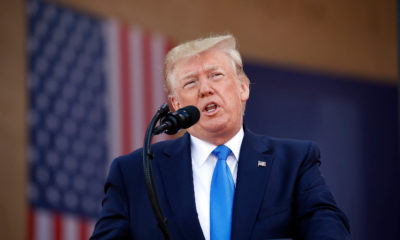World
White House urged to investigate Trump adviser
 Washington: The US Office of Government Ethics (OGE) has called on the White House to investigate presidential adviser Kellyanne Conway for advertising on television the clothing brand belonging to President Donald Trump’s daughter, Ivanka Trump.In a letter addressed to White House Deputy Counsel Stefan Passantino on Tuesday, OGE Director Walter Shaub said Conway’s comments were in “clear violation” of rules against the misuse of an official position.
Washington: The US Office of Government Ethics (OGE) has called on the White House to investigate presidential adviser Kellyanne Conway for advertising on television the clothing brand belonging to President Donald Trump’s daughter, Ivanka Trump.In a letter addressed to White House Deputy Counsel Stefan Passantino on Tuesday, OGE Director Walter Shaub said Conway’s comments were in “clear violation” of rules against the misuse of an official position.
“There is strong reason to believe that Conway has violated the Standards of Conduct and that disciplinary action is warranted,” Shaub wrote in a letter, Time magazine reported.”I note that OGE’s regulation on misuse of position offers as an example the hypothetical case of a Presidential appointee appearing in a television commercial to promote a product. Ms Conway’s actions track that example almost exactly. Therefore, I recommend that the White House investigate Conway’s actions,” Shaub added.
Two weeks ago, US luxury department store chain Nordstrom withdrew Ivanka’s line of clothing from its stores over a drop in sales in recent months, a move interpreted by Trump as a personal attack.During an interview with Fox News last week, Conway gave a “free commercial” for the Ivanka Trump brand, according to the adviser herself.”Go buy Ivanka’s stuff. It’s a wonderful line. I own some of it,” Conway said.Conway’s comments substantially sparked a controversy in the country, and the chairman of the US House Committee on Oversight and Government Reform, Republican Jason Chaffetz, and the highest-ranking Democrat of the body, Elijah Cummings, requested the OGE to review the case.Asked about Conway’s comments, White House Press Secretary Sean Spicer said she had been “counselled on that subject — and that’s it”.
World
Lockdowns in China Force Urban Communities to Defy Censorship and Vent Frustration Online

Shanghai’s rich middle class is leading a wave of online dissent over the strict and prolonged lockdowns imposed in various parts of the country. Chinese internet censorship is struggling as patience is wearing thin in many urban centers, coming up with creative forms of online protests.
Social Media Posts Revealing Lockdown Tension in Shanghai
Drawn-out lockdowns are nothing new in China as authorities insist with the nation’s zero-Covid policy since the start of the pandemic. Currently over This time around, however, metropolitan areas like Shanghai are increasingly difficult to keep quiet, given that its more than 25 million residents have seen weeks of total isolation along with food shortages and many other service interruptions.
Dozens of towns and reportedly over 300 million Chinese citizens have been affected by lockdowns of different severity. As expected, urban netizens have been most outspoken over their difficulties by finding creative ways to get around state censorship and bans placed on topics, news comments and spontaneous campaigns.
Shanghai residents have been using mobile proxies and hijacking seemingly unrelated hashtags to talk about healthcare issues, delivery failures and the overall severity of their situation. The “positive energy” that the Chinese government wants to transmit during the recent prolonged series of lockdowns does not come naturally to those counting food supplies and online censors are working hard to filter words, trending topics and undesired social media sharing.
WeChat groups and message threads are under constant monitoring. Posts questioning the zero-Covid approach have been quickly deleted, including by leading Chinese health experts like Dr. Zhong Nanshan. Video footage is soon censored and protests and investigations are quickly made to disappear.
Where this has not worked, officials have exposed banners with warnings and outright threats like “watch your own mouth or face punishment”, while drones have been patrolling the city skies. Yet, if anything, this has led to further tensions and unspoken confrontation with Shanghai’s educated and affluent middle class.
Creative Online Solutions Harnessing Civic Energy
Announcements by Chinese social media that they would be publishing the IP addresses of users who “spread rumors” have not helped either. Tech industry research has shown that much of Asia’s tech-savvy population has a habit of using mobile proxies and other privacy tools, quickly finding workarounds to browse the internet freely and talk to the world about the hottest topics.
The sheer volume of forbidden posts is already a challenge for the very censorship system, experts explain. Unable to track all trending hashtags, state workers overlook topics that speak about the US, Ukraine or other popular news. Linking human rights elsewhere to their situation, Chinese online dissidents establish their informal channels and “hijack” the conversation to share personal or publicly relevant information about the Covid suppression in their town.
Sarcastic and satirical posts still dominate. Others hope to evade the censors by replacing words from famous poems or the national anthem. One thing is certain – social media, when harnessed with the right creativity, has proven its ability to mount pressure on the government in even some of the most strictly controlled tech environments like China.























